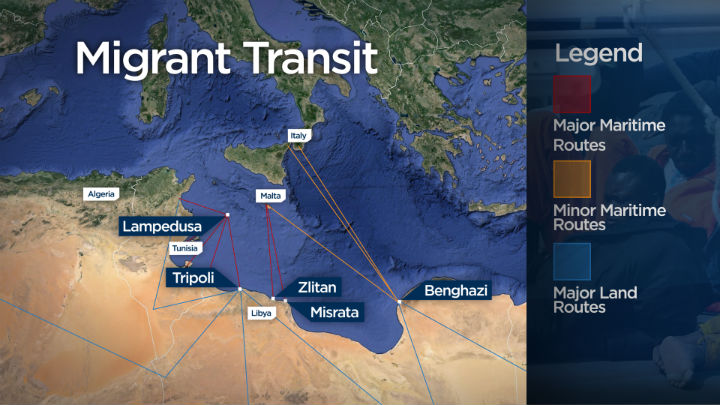WATCH ABOVE: The captain of a boat the capsized in the Mediterranean Sea with hundreds of migrants on board, appeared in an Italian court on Friday. He and a crewmember are being blamed for the deaths of more than 800 migrants fleeing for a better life in Europe. Stuart Greer reports.

European leaders rushed to address the migrant crisis in the Mediterranean Sea this week, promising to triple the amount of financial assistance needed to rescue the thousands of migrants trying to get to European shores.
At an emergency summit in Brussels on Thursday, the leaders of 28 European Union member states agreed to increase military patrols, not just to expand search and rescue capabilities but to stop human smuggling before it starts —tacking out the migrant traffickers’ boats before they leave the shores of Libya.
READ MORE: Dinghies and shoddy wooden boats — How smugglers ship migrants to Europe
While it’s a struggle for Europe to keep up with the continuously swelling influx of migrants arriving on the continent’s shores, stopping them from coming or sending them “back where they came from” — or anywhere else — is not the answer, say critics of how the crisis is being dealt with.
“If you turn around boats that are fleeing from Libya and send them straight back to Libya you’re injecting them straight back into the danger that they’ve fled,” Hans Lucht, a senior researcher at the Danish Institute for International Studies, told BBC.
He suggested attempts to thwart smuggling operations isn’t going to be as simple as destroying boats.
The International Committee for the Red Cross, in a statement on Friday, also warned possible military operations to destroy suspected migrants boats “need to be carefully evaluated and monitored for their humanitarian impact on vulnerable migrants.”
Doctors Without Borders criticized the investment in military force over humanitarian aid.
“We are amazed to see that the huge means and resources allocated to declaring war on smugglers are not equally invested in saving lives,” Aurelie Ponthieu, a humanitarian adviser with the organization, told Reuters.
READ MORE: Who are the migrants trying to get to Europe? How many die trying?
The military option, and others in the European Commission’s 10-point action plan released earlier this week, don’t entirely address what drives the migrants to flee to Europe.
But, is more development assistance, for the countries where migrants come from, a solution? Not entirely. Just look to Eritrea as an example.
Of the more than 800 migrants believed to have died when the boat capsized approximately 112 kilometres off Libya’s coast on Saturday, UNHCR estimated 350 came from Eritrea — a country that ranks poorly on human rights, press freedom and poverty indexes.
READ MORE: What migrants risk trying to cross the Mediterranean to Europe
But, the Eritrean government has hailed its own success at achieving some of the United Nations Millennium Development Goals (MDGs) — eight objectives set forth 15 years ago aimed at reducing extreme poverty, improving education and healthcare, stopping the spread of HIV/AIDS, and so on.
The goals were due to be achieved by this year.
Although the UN Development Program called Eritrea’s progress on the goals “impressive,” that’s clearly not enough to make life better, author Michela Wrong wrote for Foreign Policy.
Eritreans made up the second-highest number of migrants crossing the Mediterranean in 2014, according to the United Nations High Commission for Refugees — 34,561 Eritrean migrants, second only to Syria’s 60,651 migrants.
Wrong explained that dropping disease rates and less infant mortality are obviously good things, but Eritrea lacks opportunity and had not put the same resources into tertiary education as it has primary education. And a lack of democracy doesn’t help either: president/dictator Isaias Afwerki has led the country since it gained independence from Ethiopia in 1993. He’s ruled with an iron fist, quashing opposition and freedom of expression.
“Dissent is forbidden. It is thought there are more than 800 prisons dispersed across the country. Some take the form of shipping containers in the desert. Torture is widespread,” Sinéad O’Shea, a journalist who got a rare opportunity to film a television documentary in Eritrea, wrote for The Guardian on Friday.
She added there are some 800 prisons in the country of just 6.38 million and “torture is widespread.”
It’s conditions like these that will continue to drive the illegal smuggling of migrants, Alexander Betts, director of Oxford University’s Refugee Studies Center, told the Washington Post.
“People are moving because they are vulnerable and because they are desperate, and that’s what creates the demand for smuggling.”



Comments